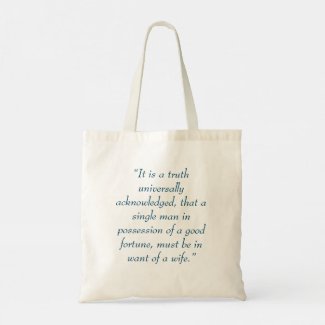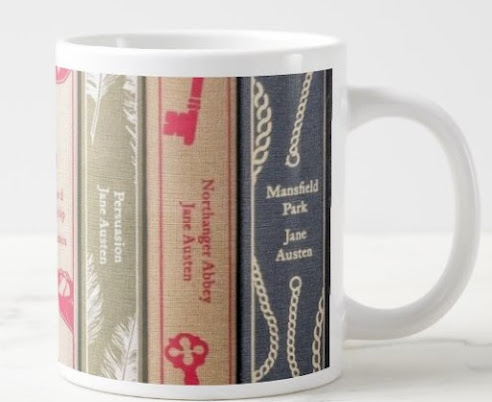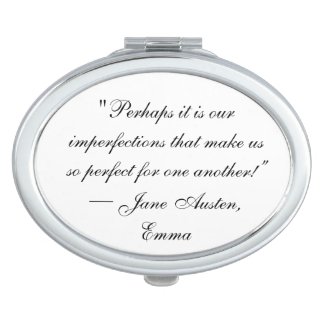Extracts from WH Auden's "Letter to Lord Byron"
There is one other author in my pack:
For some time I debated which to write to.
Which would be least likely to send my letter back?
But I decided I'd give a fright to
Jane Austen if I wrote when I had no right to,
and share in her contempt the dreadful fates
Of Crawford, Musgrave, and Mr. Yates.
You could not shock her more than she shocks me;
Besides her Joyce seems innocent as grass.
It makes me uncomfortable to see
An English spinster of the middle class
Describe the amorous effects of `brass',
Reveal so frankly and with such sobriety
The economic basis of society.
 |
Jane Austen products available at Totally_Jane_Austen |
Readers (and viewers) of Pride and Prejudice can't help but be struck by how everyone seems to know a person's net worth. Even before we encounter Mr. Bingley and Mr. Darcy directly, we know that the former has 4,000 pounds a year, less than half of the 10,000 a year ascribed to the master of Pemberly. But it is in Sense and Sensibility that Austen is at her most incisive about the role money plays in people's lives and mocks those who say they disdain "wealth" while assuming a large sum as a bare minimum.
In chapter 17, the two sisters discuss wealth versus competence, starting with Marianne's question:
“What have wealth or grandeur to do with happiness?”
“Grandeur has but little,” said Elinor, “but wealth has much to do with it.”
“Elinor, for shame!” said Marianne, “money can only give happiness where there is nothing else to give it. Beyond a competence, it can afford no real satisfaction, as far as mere self is concerned.”
“Perhaps,” said Elinor, smiling, “we may come to the same point. Your competence and my wealth are very much alike, I dare say; and without them, as the world goes now, we shall both agree that every kind of external comfort must be wanting. Your ideas are only more noble than mine. Come, what is your competence?”
“About eighteen hundred or two thousand a year; not more than that.”
Elinor laughed. “Two thousand a year! One is my wealth! I guessed how it would end.”
“And yet two thousand a-year is a very moderate income,” said Marianne. “A family cannot well be maintained on a smaller. I am sure I am not extravagant in my demands. A proper establishment of servants, a carriage, perhaps two, and hunters, cannot be supported on less.”
Marrying for money does work out for some
Marianne is correct in her estimate of the minimal income requires to maintain Willoughby's lifestyle. He does enjoy the good life and hunting, which is exactly why he ends up marrying Miss Sophia Grey who has 50,000 pounds of her own.
That level of wealth certainly makes up for her being not as much to his taste as Marianne is, particularly when he is disinherited by Mrs. Smith for having impregnated Eliza and refusing to marry her. Austen makes a point of saying that the wicked aren't punished in her novel, and Willoughby does enjoy his lifestyle.
The final chapter of the book assures us that even if he regretted the loss of Marianne, we should not assume Willoughby's life was one of suffering:
But that he was for ever inconsolable, that he fled from society, or contracted an habitual gloom of temper, or died of a broken heart, must not be depended on—for he did neither. He lived to exert, and frequently to enjoy himself. His wife was not always out of humour, nor his home always uncomfortable; and in his breed of horses and dogs, and in sporting of every kind, he found no inconsiderable degree of domestic felicity.
Similarly, Lucy Steele enjoys her advancement in jilting Edward Ferrars for his brother once their mother conferred the income that should have gone to the eldest on Robert:
The whole of Lucy’s behaviour in the affair, and the prosperity which crowned it, therefore, may be held forth as a most encouraging instance of what an earnest, an unceasing attention to self-interest, however its progress may be apparently obstructed, will do in securing every advantage of fortune, with no other sacrifice than that of time and conscience.
Where does one draw the line between mercenary and prudent?
Both Lucy Steele and Willoughby are clearly not models of behavior. That they achieve happiness of their own sort, Austen assures us, is due to the world not always living up to out expectations of fairness. However, the treatment of marrying for money is treated with more nuance in Pride and Prejudice.
Wickham, a character very much like Willoughby amuses himself with flirting with various women, including Elizabeth, until he shifts his attention to King, whose chief attraction is her 10,000 pounds. Elizabeth doesn't resent Willoughby's defection. She discusses this with her aunt, Mrs. Gardiner:
“Pray, my dear aunt, what is the difference in matrimonial affairs, between the mercenary and the prudent motive? Where does discretion end, and avarice begin? Last Christmas you were afraid of his marrying me, because it would be imprudent; and now, because he is trying to get a girl with only ten thousand pounds, you want to find out that he is mercenary.”
Mrs. Gardiner had also warned Elizabeth not to get her hopes up for Col. Fitzwilliam. As a younger son, he admitted, he would be looking to ally himself with wealth, and Elizabeth, with no more than a thousand pounds to be settled on her, would also need to make a more advantageous match from a material point of view.
Charlotte Lucas offers yet another example of the difficulty in pinning down where discretion ends and avarice begins. Her marriage to Mr. Collins is completely motivated by material concerns. Though it gets subsumed under the main plot, one of the subplots of the novel is Elizabeth's coming to terms with her best friend's decision. She does turn away from her from a while but does comes to realize that Charlotte does make the best of things and is not unhappy.
 |
| Jane Austen novels on a wallet from Totally_Jane_Austen |
The value of beauty in hard currency
Charlotte recognizes that she has less appeal on the marriage market because of her lack of beauty, which is why, as a plain woman of 27 with no fortune of her own, she believes that this 25 year-old clergyman who stands to inherit Longbourn is really the best deal to which she can aspire. This calculus of what a woman's looks entitle her to expect is made explicit in Sense and Sensibility.
In Chapter 33, John Dashwood observes to Elinor how Marianne loss of beauty (at 17) will mar her marriage prospects:
At her time of life, any thing of an illness destroys the bloom for ever! Hers has been a very short one! She was as handsome a girl last September, as I ever saw; and as likely to attract the man. There was something in her style of beauty, to please them particularly. I remember Fanny used to say that she would marry sooner and better than you did; not but what she is exceedingly fond of you, but so it happened to strike her. She will be mistaken, however. I question whether Marianne now, will marry a man worth more than five or six hundred a-year, at the utmost, and I am very much deceived if you do not do better.
Related




